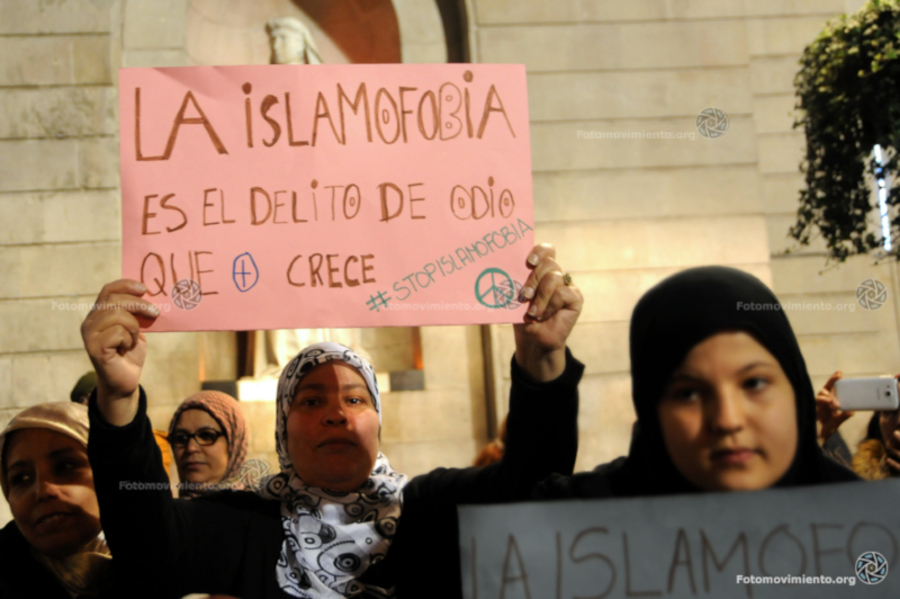Books and publications
Index / Activities / Books and publications / Presentation of the Year 2018 Report published by the Islamophobia in the Media Observatory
Presentation of the Year 2018 Report published by the Islamophobia in the Media Observatory
June 24, 20197:00 p.m.
MADRID
Casa Árabe Auditorium (at Calle Alcalá, 62).
7:00 p.m.
Free entry until the event’s capacity is reached.
In Spanish.
On June 24 in Madrid, Casa Árabe is presenting the results of the latest report published by the Islamophobia in the Media Observatory.
Taking part in the event are Tommaso Chiamparino, coordinator of the European Commission to fight Anti-Muslim Hatred; Rosa Meneses, a journalist who specializes in the Middle East and Maghreb regions, and the Secretary General of RSF’s Spanish Section; Nessrin El Hachlaf, a lawyer and journalist; Lurdes Vidal, an editor for Afkar/Ideas of the European Institute of the Mediterranean, and Pedro Rojo, president of the Al Fanar Foundation for Arab Knowledge.
Presented by:
Karim Hauser, Casa Árabe’s International Relations Coordinator
The media, especially since the advent of digital media, are the main mechanism for influencing public opinion. Within this context, as is logical, the media’s dynamics when conveying information cannot be completely separate from social prejudices. Islamophobia, the distorted, threatening image through which society often perceives Muslims, is fueled by the normalization which the media creates with it, sometimes justifying that it does so under the premise of freedom of expression. But to what extent can there be freedom to stigmatize an entire social group whose members suffer systematic discrimination in various realms of their lives? The report being presented by the Islamophobia in the Media Observatory studies the way in which the Muslim community has been portrayed with through the media, the reach which these types of messages can have and where we should draw the line between freedom of expression and hate crimes.
Presentation information sheet
Tommaso Chiamparino has been the European Union Coordinator Against Anti-Muslim Hatred since 2018. His work focuses on helping to determine the response which the EU should give to the racism, hatred and intolerance endured by Muslims and people who are perceived as such. The coordinator acts as a liaison for contact by civil society organizations and Muslim communities with domestic and foreign institutions. Prior to this position, Chiamparino worked on analysis and accountability in online hate discourses and on the implementation of the Code of Conduct signed by the European Commission in 2016.
Presented by:
Karim Hauser, Casa Árabe’s International Relations Coordinator
The media, especially since the advent of digital media, are the main mechanism for influencing public opinion. Within this context, as is logical, the media’s dynamics when conveying information cannot be completely separate from social prejudices. Islamophobia, the distorted, threatening image through which society often perceives Muslims, is fueled by the normalization which the media creates with it, sometimes justifying that it does so under the premise of freedom of expression. But to what extent can there be freedom to stigmatize an entire social group whose members suffer systematic discrimination in various realms of their lives? The report being presented by the Islamophobia in the Media Observatory studies the way in which the Muslim community has been portrayed with through the media, the reach which these types of messages can have and where we should draw the line between freedom of expression and hate crimes.
Presentation information sheet
Tommaso Chiamparino has been the European Union Coordinator Against Anti-Muslim Hatred since 2018. His work focuses on helping to determine the response which the EU should give to the racism, hatred and intolerance endured by Muslims and people who are perceived as such. The coordinator acts as a liaison for contact by civil society organizations and Muslim communities with domestic and foreign institutions. Prior to this position, Chiamparino worked on analysis and accountability in online hate discourses and on the implementation of the Code of Conduct signed by the European Commission in 2016.

